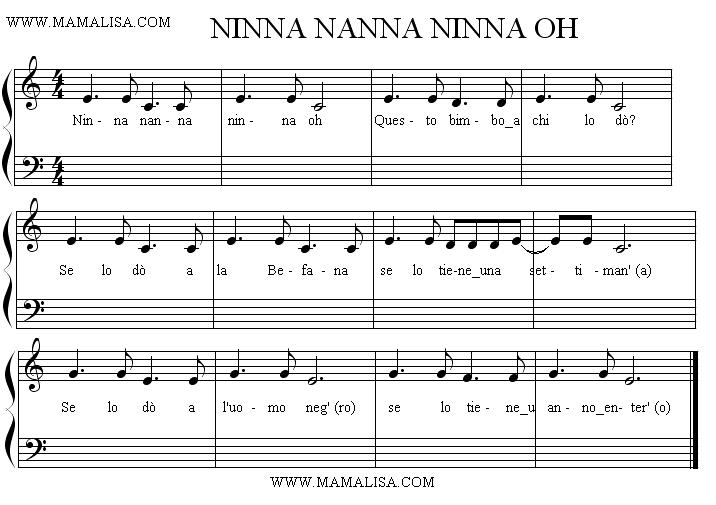Ninna nanna, ninna oh
Ninna nanna, ninna oh
Lullaby, Lullaby, ooh
Lullaby
Lullaby
(Italian)
(English)
Ninna nanna, ninna oh
Questo bimbo a chi lo dò ?
Se lo dò alla Befana,
Se lo tiene una settimana.
Se lo dò all'uomo nero,
Se lo tiene un anno intero.
Ninna nanna, ninna oh,
Questo bimbo me lo terrò!
Lullaby, lullaby, ooh,
Who will I give this baby to?
If I give him to the old hag,
For a week she will keep him, ahh.
If I give him to the bogeyman,
For a whole year he'll keep him,
Lullaby, lullaby, eeee
I will keep this baby for me!
Notes
"La Befana" is translated here as "old hag". "La Befana" is also a name for the old lady who brings gifts to children around Christmastime in parts of Italy. As that figure, "La Befana" represents the Epiphany (celebrated on January 6th), which is when the 3 magi brought gifts to Jesus. Some children are brought gifts on the eve of the Epiphany by "La Befana". We're not certain, but we believe that in this song "La Befana" does not refer to that figure, but rather to a more general "old hag". You can read more about "La Befana" here.
"L'uomo nero" is the bogeyman. In Italian, the phrase literally translates to "black man" because he's dressed in a long black coat with a hood hiding his face. ("Black man" has no rascist connotations.) "L'uomo nero" doesn't usually harm kids, but he does take them away to a scary place. In this lullaby, he takes them away for a year.
I asked Emanuela Marsura, an Italian teacher, about the "l'uomo nero" (black man). Here's what she wrote:
"Our 'black man' (l'uomo nero) is a character of fantasy that every mother and father mentions to his child to persuade him he has to go to sleep or eat without a tantrum. We also have a game about 'l'uomo nero'.
Every child imagines the black-man in a different way, but certainly scary, dark. Mom and Dad say that the black man can take away the children."
*****
Toni MacNeish sent us another version of this lullaby:
Ninna nanna, ninna oh
Questo bimbo a chi lo do?
Se lo do alla befana
Se lo tiene una settimana
Se lo do al lupo nero
Se lo tiene un anno intero
Se lo do a lupo bianco
Se lo tiene tanto tanto
Ninna oh ninna oh
A nessuno lo daro'!
Translation
Lullaby, lullaby, ooh.
Who will I give this baby to?
If I give him to the old hag
For a week she will keep him.
If I give him to the black wolf
For a whole year he'll keep him
If I give him to the white wolf
For very long he'll keep him,
Lullaby, lullaby, lullaby, hmm
To no one I'll give him!
Comments

Thanks and Acknowledgements
Many thanks to Sandrine Quinchon for contributing this song. Translated by Monique Palomares and Lisa Yannucci.
Many thanks also to Toni MacNeish for the second version of this song.
Thanks to Emanuela Marsura for commenting on this song.
Grazie mille!


























